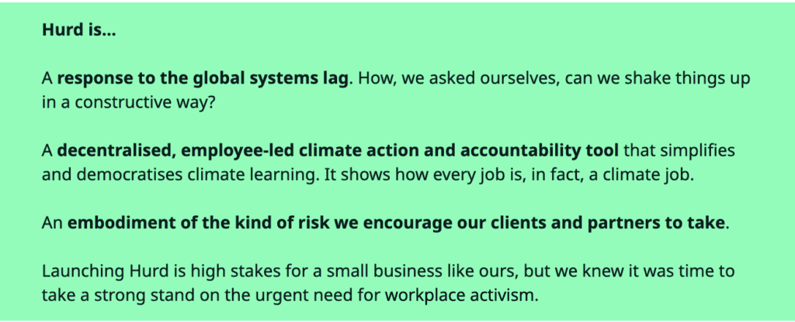Unleashing the potential of our roles for systems change
I imagine we have all, at some point, sat at a family meal over the holidays and hoped privately that a certain relative would make more of an effort this year. We might even have been that person ourselves, to someone else. This Christmas, as I slipped back unconsciously into my own childhood role, reacting and overreacting to the same old things, a question floated into my mind: Can I expect change in other people without questioning, first, the possibility of change within myself? If we are all playing our roles within the same ecosystem, should I not examine its underlying conditions – the invisible laws that ensure none of us ever budge?
I then realised that I might say the words ‘systems change’ to clients multiple times a day without asking myself what the term really means in practice – for me, for them, and for the human ecosystems in which we exist.
There’s an irony, here, one I’m sure my own family wouldn’t hesitate to call out. ‘Why does everything have to lead back to work, Maman? Can’t we have an interesting discussion for its own sake?’ Yes, well, they would be right. Here I am, about to discuss the nature of change, unable to change my own nature as an entrepreneur, which tells me to seize every passing idea as an opportunity for Kite’s ‘thoughtful action’.
Can we ever escape a system? Can we change the nature of the roles and outlooks it shapes? For the longest time, I felt like systems were always catching up with me. Back when I had a global job in a large corporation I thought, ‘Great, finally a chance to have an impact!’ only to understand that the best I could hope for, in a big machine, was incremental change. I experienced the inevitable cycles of internal politics and inertia associated with global corporations, and the only option, at the time, seemed to lie in breaking away to try and influence things from the ‘outside’. So I became an entrepreneur.
While I found much of the freedom and excitement I was looking for, and still do, guess what – I was still fundamentally dependent on the same big corporates, courting them to pursue the work I wanted to do. I was back in the same system and in some ways contributing to the collective inertia. How can we change a system in which we are all so interdependent?
We’ve come full circle – back to the question of roles. The word ‘role’ is a very interesting one. In Elizabethan times (if you’ll allow me a brief digression, courtesy of my colleague Sophie de B who explained this to me), an actor’s ‘role’ came from the roll of paper he would receive containing his part. But to avoid plagiarism (London theatres were very competitive, and there was a black market for plays), these rolls of paper would contain solely the actor’s lines and queues. What that meant, in practice, was that the actors (having typically had only one rehearsal, if any) would have no clear idea of what the play was about, or how it would go. They would act out the story in live time, reacting to their fellow actors almost as they would, spontaneously, in real life. There was an inherent freedom not just in the role they were given, but in the act of embodying a role more generally. Their role, and mission, as an actor, was to listen deeply and respond to what was in front of them as thoughtfully and creatively as possible. They were bound by barely any preconception or instruction and had a degree of agency over the play’s direction that would be unthinkable to most directors today. Quite the analogy!
Do we bring so much intention and imagination to our own professional roles today? We tend to think of them, by default, as being ‘assigned’ to us: already moulded; fixed in time for a certain purpose or outcome. But what if we gave ourselves license to see our roles as vehicles for the change we want to see in the world, for new kinds of interactions, dynamics, and dialogue? If we remember that a role’s parameters are meant to be tested, we understand that its limits – not its contents – are where its creative potential ultimately lies.
What I want to do as an entrepreneur will be vastly different from what someone else wants to achieve as a CFO, a COO, a Head of Sustainability, a Head of Communications, a Head of HR, a junior manager, a data analyst, a graphic designer, a writer, an investor…. We are all here to do more with our roles than what they initially presented us with.
When people ask ‘what role they can play’, they don’t always know they can unlock their professional role as it exists today and expand the horizon of what they already do. And that’s precisely where I think green transformation starts.
When Kite launched Hurd, the friendly Glassdoor of green transformation, we wanted to allow all employees to demand more, and do more, for climate action at work. We designed an app that assesses your climate empowerment level, allows you to report on different aspects of your company’s progress, and provide you with role-specific learning tips and professional solutions.

It was this same spirit of activism ‘at work’ – that led us to create Debatable, a live debate platform for the reconciliation of diverse perspectives on the most critical issues of our time. It was launched with Activism Works in a sold-out Théâtre du Châtelet in June 2023 featuring Greta Thunberg, Vanessa Nakate, Helena Gualinga, Camille Etienne, Harjeet Singh and Alexandra Palt from L’Oréal, in partnership with Silencio Paris and Brut Media. We believed that in the face of increasingly polarised, entrenched and siloed conversations, the rise of misinformation, disinformation and anti-expertise and the disappearance of nuanced thinking on social media, the world has never needed constructive disagreement so much.
I saw this first-hand in the weeks before COP28, when, in a session I moderated for SHE Changes Climate and The Dandelion Project between Former President of Ireland Mary Robinson and His Excellency Dr Sultan Al-Jaber, tensions rose (and were later reported in the press) around the case for and commitment to fossil fuel phase-out. The greatest outcome of this exchange was not actually the disagreement, but rather the fact that it was allowed to happen in the first place, creating new conditions for that conversation to thrive.
We live in a distressingly ‘hot’ climate in more ways than one. Business leaders have never been under so much pressure to take a stand on critical issues and manifest the courage that they role demands; while others, in the Global South, reckon with truly existential pressures. But systems change was never going to be the burden of a single person. Only through a compounding effect of everyone, everywhere, activating their own role at the same time, will systems transformation succeed.
(The research & learning content we develop at Kite Insights provides the necessary foundation for systems transformation and the just transitions it requires)
People say people never change. They also say it only takes one person to change the world. My personal view is that, regardless of the outcome, the world starts to feel bigger when you realise you have a role to play, something to push back against and allies to do it with.
So here’s to a new year of deep introspection, bold action and daring to care deeply. To all our roles, to what they could do in 2024 that we didn’t think was possible.



COMMENTS